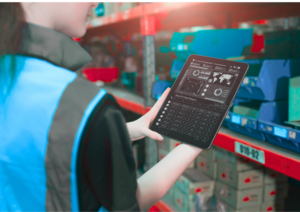Inventory management is at times overlooked as a secondary element of good business practice.
This could not be further from the truth! This Ultimate Guide to Inventory Management will help you to optimise your inventory management strategy.
What is Inventory?
Inventory refers to the physical products stored in your stockrooms and warehouses which are sold to your customers or which you call off to use as part of your supply chain or manufacturing processes.
Inventories can range from lab specimens to food ingredients to finished products such as medicines, spare parts, items of clothing and so on.
If you are not familiar with the terminology related to inventory management, why not check out our useful ABC Guide to Inventory Management.
Types of Inventory
According to Quickbooks, there are 4 types of inventory.
Raw materials
These are the basic “ingredients” which you will need to manufacture your goods. They could be part components, such as bolts and nuts, or edible or pharmaceutical ingredients with a determined shelf life. These materials will be used as part of your manufacturing process to produce finished goods which you will sell on to your customers.
Maintenance, Repair and Operating Inventory (MRO)
These items refers to the products required to keep your manufacturing process in top condition and include industrial equipment, repair toolkits, spare parts for your manufacturing equipment, uniforms and PPE and cleaning supplies.
MRO items can make up quite a large proportion of your purchases, which are usually not organised and managed in the same efficient way as inventory should.
The inability to quickly locate a spare part in case of machinery breakdown can result in costly downtime during the manufacturing process. Ensuring that MRO items are labelled and managed efficiently using a reliable inventory management solution can make a big difference to producers!
Finished Goods Inventory
Finished goods are items or products which have been manufactured by your company or which you have bought from your suppliers. These items do not require to undergo any other processes and are ready to be sold.
Shipping Materials Inventory
Packing and shipping materials such as cardboard boxes, pallets and padding are, like MRO items, often overlooked when it comes to inventory management processes. Ensuring that all the shipping materials are labelled and stored correctly will help speed up your company’s logistics efforts.
Inventory Management Software
When is it a good time to consider inventory management software options?
Check out our post about why it is important to manage your stock efficiently .
First of all, it is crucial that you have a solid and reliable inventory management process in place – check out our Top Tips guide.
Considering a stock control and tracking software solution which will allow you to automate your stock control process is key from the very start. This will ensure that any potential teething issues are resolved quickly and, as the company grows, your inventory management platform can grow on solid foundations with it.
Whilst setting up and integrating a new platform will require an initial investment, a trusted inventory management solution can help your business save on overhead and wastage costs.
In addition to providing real-time stock movement information, a reputable stock management solution will be able to automatically detect any expiry-soon items and prioritise them for shipping, thus avoiding any wastage.
Returns can also be managed efficiently, enhancing your customer service effort.
If you need any further convincing, read the reasons why your business needs our inventory management solutions.




